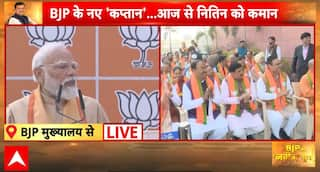Lily Thomas Vs Union Of India: 2013 Petition That Cost Rahul Gandhi His MP Seat 10 Yrs Later
Rahul Gandhi lost his status as MP after his conviction in a defamation case. A provision in the law that could stop this was struck down by SC while hearing a petition filed by advocate Lily Thomas.

Rahul Gandhi Disqualification: Congress leader Rahul Gandhi has been disqualified as a Member of Parliament after a Surat court Thursday held him guilty of criminal defamation over his ‘Modi Surname’ remark. He had made the remark during the 2019 Lok Sabha poll campaign. As the Congress leader's conviction and disqualification continue to make headlines, a name that is doing the rounds is Lily Thomas. It was her petition that made the Supreme Court rule that convicted MPs would immediately lose their place in Parliament.
So, who is Lily Thomas? She was a lawyer who wanted to ensure convicted MPs should not get a chance to use any loophole in the laws to stay in power. Here is a look at the petition that changed law for convicted legislators.
Section 8(4) Of the Representation of the People (Act), 1951
Known as an activist lawyer, Lily Thomas had filed many PILs for women’s rights and railway workers, among others. However, what made her most famous was her petition that challenged a provision in the Representation of People (Act) 1951.
In 2013, Thomas challenged Section 8(4) of the Representation of the People (Act) in the Supreme Court. Although it is Section 8(3) that rules the action be taken in case of conviction, Section 8(4) aided politicians after such a judgment.
Section 8(3) of the 1951 Act says: "A person convicted of any offence and sentenced to imprisonment for not less than two years [other than any offence referred to in sub-section (1) or sub-section (2)] shall be disqualified from the date of such conviction and shall continue to be disqualified for a further period of six years since his release.”
However, Section 8(4) provided a three-month window to convicted legislators to appeal against the order, thereby halting immediate disqualification. Because of this section, a convicted MP or MLA could remain in office by just filing an appeal within three months of the conviction.
The objective of Thomas's petition was to stop such politicians from contesting and even winning polls after getting a stay on the conviction from courts.
Lily Thomas Petition Verdict
After hearing the petition, the Supreme Court struck down Section 8(4) of the Representation of the People (Act) 2013. What the verdict implied was that there would be no window of appeal and a legislator stood disqualified immediately when convicted for two or more years of imprisonment.
UPA Govt's Reaction To Verdict
This part is interesting. After the top court struck down the section as null and void, the Manmohan Singh-led government brought an ordinance to nullify the SC ruling. Ironically, Rahul Gandhi had himself opposed the ordinance and reportedly tore it apart at a press conference.
According to reports, Lily Thomas was ready for another fight with a review petition. But the matter never reached court as the Congress government withdrew it.
Who Is Lily Thomas?
Born on March 5, 1928, in Kerala’s Kottayam, Lily Isabel Thomas grew up in Thiruvananthapuram and went on to become one of the first few female advocates in the country. According to reports, she enrolled in the Madras High Court in 1955 after pursuing a law course at Madras University. Thomas completed her LLM in 1959, and was the first woman to do so at the varsity, multiple reports claim.
Lily Thomas went on to start practice in the Supreme Court in 1960, where only three women lawyers were in active practice during her time.
She had been filing petitions in the court since 1964 on a range of issues. One of her first pleas challenged the validity of the ‘Advocate On-Record Exam’.
She also fought for equal rights for women in property in Christian families in the landmark case of Mary Roy.
Known to be deeply religious, Thomas, who never married, famously went to court every day even after crossing 90 years. She breathed her last in 2019 at the age of 91. At the time, she was the senior-most woman lawyer in the Supreme Court.
Related Video
Delhi flood update: once again AAP points out BJP, for Delhi's present situation






























